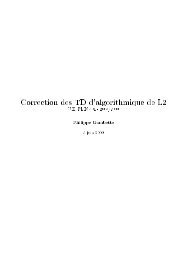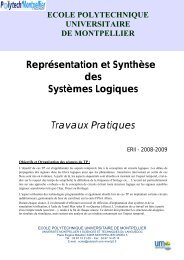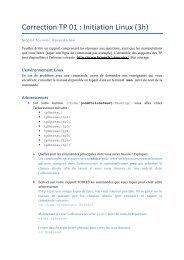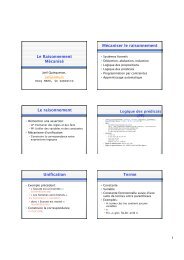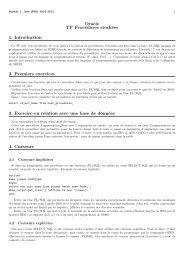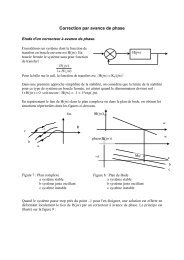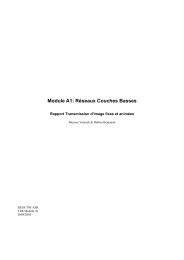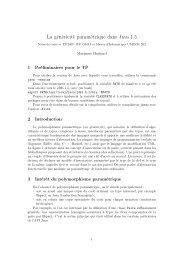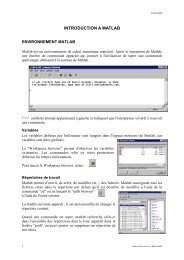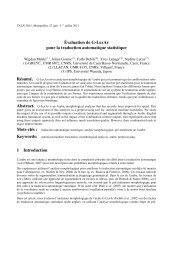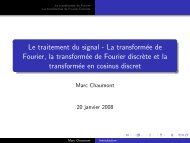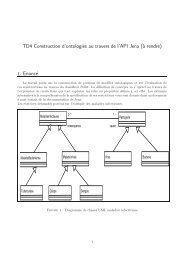Evaluating User Experience in Games: Concepts and Methods - Lirmm
Evaluating User Experience in Games: Concepts and Methods - Lirmm
Evaluating User Experience in Games: Concepts and Methods - Lirmm
Create successful ePaper yourself
Turn your PDF publications into a flip-book with our unique Google optimized e-Paper software.
160 K. Poels et al.<br />
If our tra<strong>in</strong> is delayed, I often th<strong>in</strong>k: I wish I had a Hearthstone; a WoW object that<br />
transports you to a specific location <strong>in</strong> no time. (Male participant, 23 years)<br />
Most participants also recognized game elements show<strong>in</strong>g up <strong>in</strong> dreams. The specific<br />
content of game-related dreams differed from one participant to the other. Some<br />
reported dream<strong>in</strong>g about the social aspects of the game, or dream<strong>in</strong>g about people<br />
from the game <strong>in</strong> the form of their game characters. Others described dream<strong>in</strong>g<br />
about specific quests or actions that happened <strong>in</strong> the game.<br />
I don’t dream about raids <strong>in</strong> the game, but I do dream about social aspects from the game.<br />
I sometimes see people from the game pop up <strong>in</strong> my dreams <strong>in</strong> the form of their game<br />
characters. (Male participant, 31 years)<br />
Sometimes, <strong>in</strong> my dreams, <strong>in</strong> see my game character kill<strong>in</strong>g certa<strong>in</strong> monsters <strong>in</strong> a certa<strong>in</strong><br />
area, try<strong>in</strong>g to get certa<strong>in</strong> items. Or, when I lost <strong>in</strong> a player vs. player battle, I dream of<br />
w<strong>in</strong>n<strong>in</strong>g by do<strong>in</strong>g th<strong>in</strong>gs differently. (Male participant, 21 years)<br />
Language <strong>and</strong> expressions used <strong>in</strong> the game did also seem to show up <strong>in</strong> the<br />
everyday vocabulary <strong>and</strong> th<strong>in</strong>k<strong>in</strong>g processes of our participants.<br />
I sometimes use WoW words when talk<strong>in</strong>g to my kids. For example, if they ask: “dad, can I<br />
get some money”, I say: “Gold? Eh, money”. Or, if someone does someth<strong>in</strong>g really stupid,<br />
I use the word “noob”, a word that is often used <strong>in</strong> MMORPGs to refer to someone who<br />
does not know the rules. (Male participant, 45 years)<br />
For many small th<strong>in</strong>gs you th<strong>in</strong>k <strong>in</strong> the term<strong>in</strong>ology of the game. For example, someone<br />
accidentally drops someth<strong>in</strong>g, you th<strong>in</strong>k aloud “WTF!” (= what the f∗ck!). Such th<strong>in</strong>gs<br />
happen to me quite often, but I try to only use them when talk<strong>in</strong>g to people from whom I<br />
know they are gamers as well. (Male participant, 31 years)<br />
Most participants agreed that the above-mentioned experiences seemed to happen<br />
more often immediately after game play, or <strong>in</strong> periods <strong>in</strong> which they game very<br />
<strong>in</strong>tensively (e.g., dur<strong>in</strong>g holidays). In some circumstances, this led to difficulties <strong>in</strong><br />
stepp<strong>in</strong>g back to the real world.<br />
If I have gamed very <strong>in</strong>tensively, I notice that I start us<strong>in</strong>g game related words <strong>and</strong><br />
expression more often. (Male participant, 23 years)<br />
Dur<strong>in</strong>g holidays I play a lot more than dur<strong>in</strong>g school periods. If I then return to school,<br />
it takes me a while to adapt to daily rout<strong>in</strong>e, to directly <strong>in</strong>teract with people aga<strong>in</strong>. (Male<br />
participant, 23 years)<br />
Also, these long-term experiences seem to build up gradually <strong>and</strong> become more<br />
activated when play<strong>in</strong>g a particular game for a long period of time. Some participants<br />
even reported that they completely <strong>in</strong>ternalize the game world as a part of<br />
“their life.” It became a part of their identity.<br />
Play<strong>in</strong>g games has had an <strong>in</strong>fluence on my personality, my vocabulary, <strong>and</strong> on the way<br />
I perceive the world. This is not a short term process, it is a process of years <strong>and</strong> it will<br />
probably still last for years. (Male participant, 22 years)<br />
Interest<strong>in</strong>gly, some participants mentioned that they started <strong>in</strong>terpret<strong>in</strong>g particular<br />
real-world situations, <strong>in</strong>fluenced by how these situations do occur <strong>in</strong> games. As<br />
such, what happens <strong>in</strong> the game world cultivates expectancies of what might happen<br />
<strong>in</strong> similar situations <strong>in</strong> real life.




